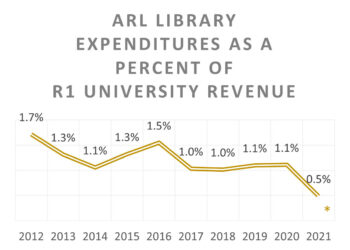
There is a fair amount of uncertainty about what might happen to publishing business models over the next 5-10 years. A major source of this uncertainty — but clearly not all of it — revolves around open access (OA)? Will OA slowly make further inroads or, via mandates, become the only option? Will a natural equilibrium assert itself? Or will OA’s inevitable flaws ultimately be its undoing? In this realm of uncertainty, enter a neat approach to risk mitigation courtesy of the Royal Society of Chemistry — the brazenly named “Gold for Gold” sales approach.
The program works like this — if your institution buys a site license to all (not some, but all) of the Royal Society of Chemistry’s journals, your faculty can apply for a limited number of available vouchers that will cover Gold open access (OA) fees.
The play on words here is three-fold. “RSC Gold” is:
. . . the fantastic resource from The Royal Society of Chemistry that offers all online journal, database and magazine content in one package, as well as a cutting-edge eBook series.
So, “gold” is used as the top-tier designation at RSC. This is the first bit of wordplay.
Gold OA is what the vouchers may cover (remember, a limited number are available for each institution). This is the second element of the wordplay.
And, of course, the other “gold” is the money being paid in order to get what is essentially a store voucher to buy other things at RSC — like a gift card at a big retailer you can only use there.
The “Gold for Gold” trade-off becomes clear in the FAQ, which states baldly:
An institution will receive a specific number of voucher codes to publish articles in RSC journals depending on the cost of their RSC Gold subscription.
It’s the classic “the more you spend, the more you save” retail technique, spread across superficially incompatible business models — the more Gold OA, it would seem, the less valuable site licenses become as a lower percentage of articles are published via the subscription model and as COUNTER usage data start to decline.
There’s a neat trick going on with “Gold for Gold.” The strategic imperative in an uncertain environment is to mitigate risk. With “Gold for Gold,” if OA continues to grow, either via natural evolution or mandated imposition, RSC is positioned well to absorb the change. If OA remains a minority element of scientific publishing or fades for some reason, RSC has lost nothing and perhaps gained some sales — either bigger sales or more sales or both.
This is slightly different from the membership models used by PLoS and BioMedCentral, where institutions pay to become a member organization, for which they get reduced APCs for their affiliated authors. That transaction is a full OA transaction. This transaction bridges business models, and ends up as essentially neutral — whatever comes, RSC is well-positioned to deal with it. This may be a long-term advantage for hybrid publishers, and “Gold for Gold” is a nice encapsulation of this superior strategic positioning. After all, completely OA publishers have all their chips on OA.
In a way, the brazen quid pro quo aspect of this impresses me the most. It’s like the person who can sense that a group has gotten into a certain level of confusion and anxiety, then tells the joke that’s hanging in the air but nobody else is quick or daring enough to articulate. “Gold for Gold” is cathartic — obviously they’re both just business models, see?
No matter what comes, RSC can go for the gold either way.
Discussion
4 Thoughts on "Gold for Gold — Royal Society of Chemistry Uses OA as Incentive to Sell "Big Deal" Site Licenses"
Nothing new under the sun. As it happens I’ve been promoting a similar idea since last year. My pitch was aimed at what I see as the worst, most madly retrograde aspect of OA, namely author charges. If an institution wants to subscribe to our company’s package of journals, its members have the right to have XX papers published in our journals on an OA basis, subject to normal peer review and acceptance procedures, with no APCs. At the author-editor-publisher nexus, the question, “shall we or shall we not publish this paper” is in this way not even potentially tainted by money considerations.
It does seem to be something new under the sun, at least as far as the broader market is concerned. I asked a few people about this, and they agreed it was a new twist. I don’t know if your idea has actually made it to the market, or is just something you’re promoting internally, but at least the people I asked hadn’t heard of anything like this being offered before. I don’t see any mention of a similar offer on your Web site (http://www.multi-science.co.uk/), but I may have missed it.
As for your “potentially tainted by money considerations” point, I’d argue that your idea is still tying money to publication ability, insofar as the library needs to have paid you in order to get the chits for its authors. You’re simply bundling the APCs into a site license deal, likely with some discounting, but the fees are essentially still there. It’s still a “pay to play” scenario.
This model creates the messy problem of allocating APC money to researchers, just as the RCUK university grant system does. In this case one wonders if the library will pick the winners since they pay the gold? That would be very interesting indeed. The tail wagging the dog?
Good for them. Societies that depend on journal (and book) revenues in order to exist are rightly nervous. In order to compete with the likes of Elsevier, we need to invest in the program and offer services and sophisticated platforms. This all takes lots of money and that money can’t be entirely (or even in small part) recouped with increasing library subscription charges. Add to that the threat of having to publish stuff and make it OA and we have a problem.
Users demand we invest in the program. Libraries demand that we keep pricing flat. The government will likely demand that we give stuff away for free. I iam glad to see some new business models emerge that might help mitigate the losses.



